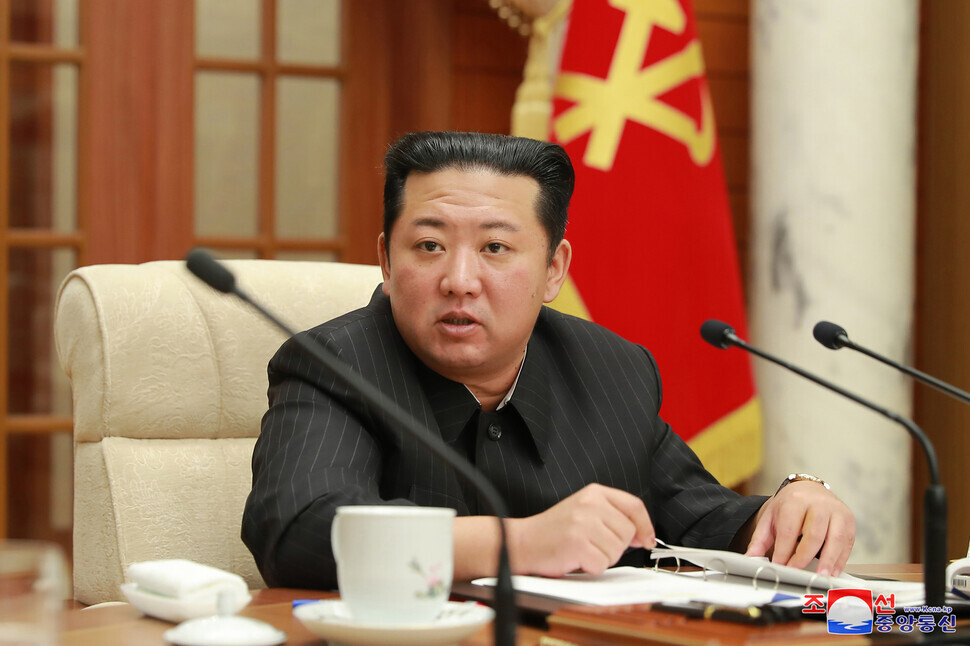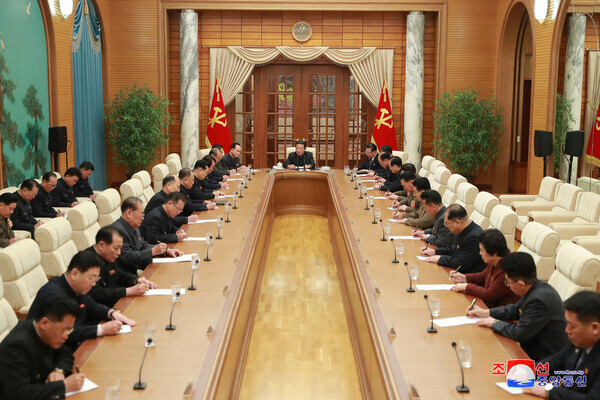hankyoreh
Links to other country sites 다른 나라 사이트 링크
[News analysis] Is N. Korea upping the ante in a bid for Biden’s attention?

North Korean leader Kim Jong-un has indicated he will halt the North’s moratorium on testing nuclear weapons and intercontinental ballistic missiles. It has been three years and nine months since Kim promised a moratorium on such tests at his Singapore summit with former US President Donald Trump on June 12, 2018.
Kim announced the suspension of these tests in a plenary session of the 7th Central Committee of the ruling Workers’ Party of Korea (WPK) on April 20, 2018, when the WPK opted to conclude its “two-track” pursuit of the economy and nuclear weapons development in order to focus its energy on the construction of a socialist economy.
This latest indication amounts to a warning that the North’s US policy could shift from seeking negotiations to a head-on confrontation. The warning came on the first anniversary of Joe Biden’s inauguration as US president.
North Korea is pushing the US to choose either proactive negotiations or a confrontation and clash since the North is no longer willing to endure the deadlock in Korean Peninsula affairs that has continued for nearly three years since the breakdown of talks at the second North Korea-US summit in Hanoi in February 2019.
The move also represents the North’s attempt to shore up public sentiment, which has been shaken by the protracted challenges of sanctions, the COVID-19 pandemic and economic troubles.
The Korean Peninsula has reached a major crossroads.
The crucial question is how the US will react, but Biden didn’t mention “North Korea” even once in a 111-minute press conference marking his first year in office. That’s proof that North Korea isn’t a priority for Washington, which is preoccupied with internal and external challenges including extreme factional conflict nearing the level of a civil war, a huge wave of Omicron infections, strategic competition with China, and the Ukraine crisis.

Paradoxically, that’s why Kim Jong-un is openly threatening to test nuclear weapons and ICBMs for the first time in 45 months and resuming the North’s struggle for recognition from the US.
But when we take a closer look at the front-page article in Thursday’s edition of North Korea’s party-run newspaper, the Rodong Sinmun, regarding the Politburo meeting of the WPK Central Committee that Kim presided over on Wednesday, Kim didn’t actually say that the North would immediately test a nuclear weapon or an ICBM. The Politburo didn’t “decide” to restart “all temporarily suspended activities” and to reconsider “trust-building measures” after discussing “the orientation for countermeasures against the US”; rather, it “gave an instruction to a sector concerned to reconsider” those matters.
In effect, the North was sounding the warning of strategic military actions, while also leaving open the possibility for a change of course. If Biden were to proactively propose “corresponding measures,” there’s every possibility that the North could pivot to denuclearization talks under the pretext of Kim making a bold decision, given the nature of the North Korean regime.
The problem is that there’s not much time. There’s precedent for the North carrying out nuclear tests and long-range ballistic missile tests on the birthday of Kim Jong-il, Feb. 16, which is known in North Korea as the “Day of the Shining Star,” and on the birthday of Kim Il-sung, April 15, known as the “Day of the Sun.”
The North carried out its third nuclear test on Feb. 12, 2013, four days before the Day of the Shining Star. Test launches of long-range ballistic missiles Kwangmyongsong-2 (April 5, 2009) and Kwangmyongsong-3 (April 13, 2012), which doomed Kim’s relationship with US President Barack Obama, both took place around the Day of the Sun.
If the North does carry out a strategic military action such as a nuclear test or an ICBM test launch, it’s more likely to coincide with the Day of the Sun than the Day of the Shining Star, which will overlap with the Beijing Winter Olympics (Feb. 4-20). In addition, if the North wants to celebrate the holiday while simultaneously countering the US, it’s more likely to launch an ICBM in the guise of putting a satellite into orbit — which can be presented as a peaceful use of space — than to carry out a nuclear test.
This suggests that North Korea’s initial deadline may be April 15. Several former high-ranking officials in the South Korean government said that the North may pressure the US with various statements and military actions of low or moderate intensity for the time being but could test an ICBM packaged as a satellite launch around April if the US doesn’t change its attitude.
A former unification minister said, “President Biden can’t afford to focus on the North Korean issue right now, given his internal and external challenges, and Chinese President Xi Jinping wouldn’t want military tensions on the Korean Peninsula to escalate, since that could create an excuse for the US to increase its military presence on the peninsula, including forward-deployed troops.”
"I’m not ignorant of Kim’s grievances and difficulties, but this is a time when self-control and wisdom are desperately needed,” the former minister said.
By Lee Je-hun, senior staff writer
Please direct questions or comments to [english@hani.co.kr]

Editorial・opinion
![[Editorial] Penalties for airing allegations against Korea’s first lady endanger free press [Editorial] Penalties for airing allegations against Korea’s first lady endanger free press](https://flexible.img.hani.co.kr/flexible/normal/500/300/imgdb/original/2024/0502/1817146398095106.jpg) [Editorial] Penalties for airing allegations against Korea’s first lady endanger free press
[Editorial] Penalties for airing allegations against Korea’s first lady endanger free press![[Editorial] Yoon must halt procurement of SM-3 interceptor missiles [Editorial] Yoon must halt procurement of SM-3 interceptor missiles](https://flexible.img.hani.co.kr/flexible/normal/500/300/imgdb/child/2024/0501/17145495551605_1717145495195344.jpg) [Editorial] Yoon must halt procurement of SM-3 interceptor missiles
[Editorial] Yoon must halt procurement of SM-3 interceptor missiles- [Guest essay] Maybe Korea’s rapid population decline is an opportunity, not a crisis
- [Column] Can Yoon steer diplomacy with Russia, China back on track?
- [Column] Season 2 of special prosecutor probe may be coming to Korea soon
- [Column] Park Geun-hye déjà vu in Yoon Suk-yeol
- [Editorial] New weight of N. Korea’s nuclear threats makes dialogue all the more urgent
- [Guest essay] The real reason Korea’s new right wants to dub Rhee a founding father
- [Column] ‘Choson’: Is it time we start referring to N. Korea in its own terms?
- [Editorial] Japan’s rewriting of history with Korea has gone too far
Most viewed articles
- 160% of young Koreans see no need to have kids after marriage
- 2Presidential office warns of veto in response to opposition passing special counsel probe act
- 3Months and months of overdue wages are pushing migrant workers in Korea into debt
- 4[Editorial] Penalties for airing allegations against Korea’s first lady endanger free press
- 5Japan says it’s not pressuring Naver to sell Line, but Korean insiders say otherwise
- 630th anniversary Wednesday Demonstration pushed out of memorial site by far-right
- 7OECD upgrades Korea’s growth forecast from 2.2% to 2.6%
- 8At heart of West’s handwringing over Chinese ‘overcapacity,’ a battle to lead key future industries
- 9[Reporter’s notebook] In Min’s world, she’s the artist — and NewJeans is her art
- 10[Special reportage- part I] Attending the funeral of the victim of a South Korean war crime in Vietn